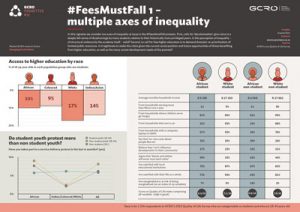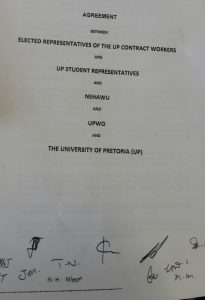by Martin Jansen
The Students Lead…. Again
The student protest movement that unfolded over the past two weeks signals the beginning of the end for the ANC regime. Strangely reminiscent of the 1976 student uprisings that followed three years after the Durban strikes of 1973, 2015’s students’ protest movement follows three years after the Marikana massacre and the state’s smashing of the Lonmin mineworkers’ strike. While the students’ victory of no fee increases for 2016 will not overcome their major problem of eradicating the high costs of accessing tertiary education, it still represents a major victory and achievement for students and the entire working class movement. By directing their demands towards national government and building a non-sectarian national movement, the students demonstrated tremendous political clarity and tenacity. The rest of the working class has taken notice and has drawn this lesson. Soon we are likely to see local communities that have engaged in hundreds of militant local struggles around “service delivery” for more than a decade, seeking unity with each other and building a national movement similar to the UDF of the 1980’s. The real mass working class united front is on the horizon to challenge our rulers. Even the complacent urban middle class has been shaken out of its post-Apartheid comfort and slumber by the student protests with the state’s brutal response and sudden caving-in to their demands.
The genie is out of the lamp and this struggle around accessing education is far from over as hundreds of thousands of students and their parents will continue to suffer the heavy burden of long-term financial debt. Similarly, they and millions of working class parents have to cough up a big part of their meagre income to pay for their children’s school fees. They too are coerced to pay and land up with huge personal debt.
For the better part of the first decade of democracy this has been the fruits of the “victory” against Apartheid and the “democratic breakthrough”. This mainly due to the ANC government’s neo-liberal economic policy, GEAR, that entrenched an improved economic climate for big business with measures such as privatisation and commercialisation of state assets and enterprises, a system of high user fees for poor people for basic public services, fiscal discipline with limited social spending with consequent lower taxation for corporations and the rich – all in the name of international competitiveness and attracting foreign investment.
For the first decade of South Africa’s democracy over a million formal jobs were destroyed and millions more informalised to drive down the cost of labour through casualisation, labour brokering, outsourcing and sub-contracting. All this euphemistically referred to by capital as “restructuring” conveniently supported and secured by the country’s new labour legislation that was readily accepted by the trade union leadership and effectively undermining workers’ resistance to these attacks on their working conditions and living standards. During this period over a million farm dwellers lost their livelihoods and right to live on farms despite legislation adopted by the new government to prevent this. The ongoing recent economic crisis has ensured more than a million more jobs lost in South Africa since 2008 and greater pressure on working class living standards.
The black working class has been driven further into poverty compounded by unusually high price increases over the past few years for basic public services – electricity, water and transport.
This is the backdrop to South Africa’s infamous claim to fame of being the most unequal society in the world with the highest levels of personal debt. This is of course not only South Africa’s good story to tell but that of most parts of the world over the past thirty years, epitomised by Greece’s socio-economic decline and its working and middle classes’ 50% drop in living standards in the past five years. Similar struggles around access to education have broken out in various parts of the world in recent times, most notably student protests in London during late 2010 against planned cuts in education spending by the government and increasing the cap on tuition fees.
However, for South Africa’s black working class these neo-liberal measures come on top of an already huge socio-economic deficit that resulted from over a century of colonialism and Apartheid capitalism.

The Significance of the Students’ Struggle
The recent student struggle around stopping increases in fees during 2016 was encouraged in no small part by the victory by UCT students’ Rhodes Must Fall Campaign earlier this year.
For the first time since 1994 we had a students’ struggle around common demands that included all the major universities and directing these demands towards national government, with rudimentary organisation and leadership that emphasised uncompromising unity and purpose. It also brought to the fore and exposed to the South African public the longstanding campaign by workers and students against outsourcing of services (cleaning, gardening, catering and security) at campuses such as UCT, Wits and UJ. The students ensured that the demand for insourcing these services was included in their memorandum to government and university management. The workers in turn provided solidarity to the students in the recent struggle, including practical support like transporting UCT and CPUT students to protest at parliament.
The UCT workers and students have since secured a major victory for insourcing workers’ employment after more than a decade of struggle. (See the copy of the agreement reached between UCT management and unions: page 1 and page 2). This victory is likely to have major positive ramifications for all workers and trade unions fighting against outsourcing in South Africa and indeed internationally, particularly in the public sector.
The students’ struggle and sudden victory over the past week begs the questions – why only now after several years of university fees tyranny and why the longest standing students’ political organisation, SASCO has previously not seriously attempted to mobilise for such a campaign since 1994? The recent experience illustrates the insidious toxic role and effect that SASCO and especially its previous generations of leaders have had on students’ struggles – diluting and holding them back. Similarly, the ANCYL with its loudmouthed “militant” leaders like Julius Malema and before him Fikile Mbalula at no stage moved beyond the rhetoric of calling for free quality education. Their role, like SASCO was to deflect and dilute students’ frustration and anger and direct their aspirations towards individual pursuit of careers with what they exemplified through their high living and the lucrative benefits of loyalty towards and serving the ruling party. Similarly too, for over two decades the Cosatu leaders have played this role, shielding the state and capital from any significant defensive struggle against the neo-liberal onslaught. This was not sustainable politically and led to deep division within the federation with its biggest and strongest affiliate, NUMSA expelled. The Cosatu leaders have delivered a severely weakened Cosatu to the ANC, unable to resist let alone pursue a revolutionary path. Mission accomplished with the rewards of high office in government for Cosatu leaders continuing.

The Penny has dropped – The ANC’s days in Power are numbered
Since 1994 and despite all its claims of delivering millions of houses (of extremely poor quality) electricity and water (expensive) and social grants (hopelessly inadequate), the ANC has perpetuated the Apartheid legacy of poverty and inequality. It has systematically shifted the responsibility of financing all levels of education to parents ensuring very limited access to quality education and a huge lifelong financial burden for them. The cost of tertiary education is extremely high and out of reach for the majority of working class students, with many unable to buy food and starving, resorting to part-time work including sex work – all this in the context of the development of the “business university”, orientating universities to serving corporate interests in its academic offerings and research.
Through its policies the ANC government has undertaken to address the skills deficit of the private sector and by so doing promised to reduce unemployment. But the reality has been that the working class has had to pay for this and the jobs not forthcoming for thousands of black matriculants and graduates who remain unemployed and stuck with a debt burden. The ANC has fundamentally continued to serve the interests of white monopoly capital, the same socio-economic force that was the core of the ruling class and main beneficiaries under South Africa’s Apartheid capitalist system.
This should not come as a surprise to us since most of the ANC’s leadership have elevated themselves from the lower classes and become part of big business, inextricably integrating their interests with that of white monopoly capital. This was well demonstrated with the Marikana strike and the various interests at play between the company, the current ANC and SA deputy president, Cyril Ramaphosa whose company was a significant shareholder in Lonmin.
In the recent students’ struggle, the ANC realised that not giving into the students’ demands and resorting to more repression would severely damage is popularity for next year’s local government election polls and could lead to a much wider working class revolt.
With the 2014 elections it had already experienced a significant drop in voter support with the main beneficiary being the newly formed Economic Freedom Fighters (EFF) to its left. This loss of voter support was mainly from the ranks of the black urban middle and working classes and prompted ANC secretary general, Gwede Mantashe to chide these defectors as “clever blacks”. The past week saw thousands more young clever blacks actively opposing the ANC government and invading the hallowed grounds of parliament with Zuma reportedly urgently meeting with cabinet ministers of the security cluster while the stun grenades, teargas, police batons and shields were punishing the invading students.
#ANCgovtmustfall
This is a sign of the times as we enter a new phase of struggle in the post-Apartheid era, a period of revival, broader and deeper political awareness and rebuilding mass organisations with co-ordination at a national level. The masses have moved beyond simply recognising the ANC’s lie of “A better life for All” with its use and abuse of the state as its main vehicle for self-enrichment by its leadership.
The masses, through the young lions of 2015 have signalled their willingness to take the struggle to a higher level – nationally and directed towards the ANC government. The next phase of the students’ struggle will be for free public quality education for all, drawing in wider layers of working class and lower middle class people into a mass of radical opposition to the ANC government who will resist this demand with all means at its disposal, including brute repression.
Jansen is a political, community and labour activist. He is also the director and editor of Workers’ World Media Productions.

